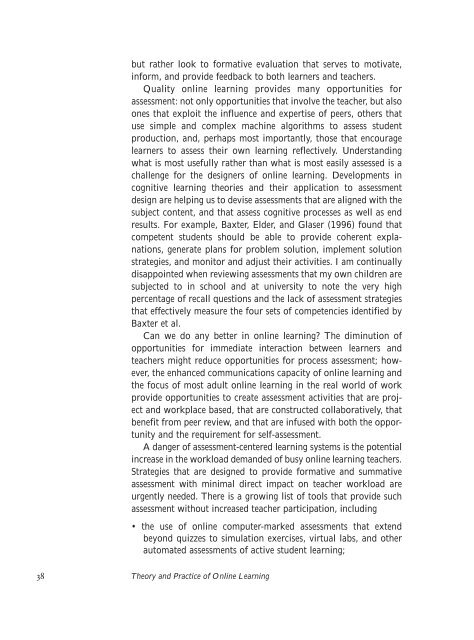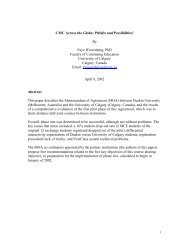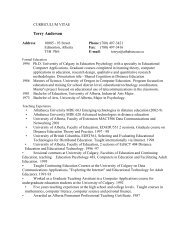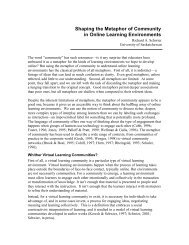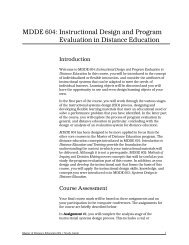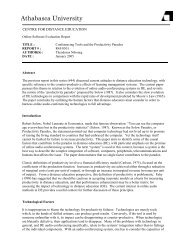Toward a Theory of Online Learning - Centre for Distance Education ...
Toward a Theory of Online Learning - Centre for Distance Education ...
Toward a Theory of Online Learning - Centre for Distance Education ...
You also want an ePaper? Increase the reach of your titles
YUMPU automatically turns print PDFs into web optimized ePapers that Google loves.
ut rather look to <strong>for</strong>mative evaluation that serves to motivate,in<strong>for</strong>m, and provide feedback to both learners and teachers.Quality online learning provides many opportunities <strong>for</strong>assessment: not only opportunities that involve the teacher, but alsoones that exploit the influence and expertise <strong>of</strong> peers, others thatuse simple and complex machine algorithms to assess studentproduction, and, perhaps most importantly, those that encouragelearners to assess their own learning reflectively. Understandingwhat is most usefully rather than what is most easily assessed is achallenge <strong>for</strong> the designers <strong>of</strong> online learning. Developments incognitive learning theories and their application to assessmentdesign are helping us to devise assessments that are aligned with thesubject content, and that assess cognitive processes as well as endresults. For example, Baxter, Elder, and Glaser (1996) found thatcompetent students should be able to provide coherent explanations,generate plans <strong>for</strong> problem solution, implement solutionstrategies, and monitor and adjust their activities. I am continuallydisappointed when reviewing assessments that my own children aresubjected to in school and at university to note the very highpercentage <strong>of</strong> recall questions and the lack <strong>of</strong> assessment strategiesthat effectively measure the four sets <strong>of</strong> competencies identified byBaxter et al.Can we do any better in online learning? The diminution <strong>of</strong>opportunities <strong>for</strong> immediate interaction between learners andteachers might reduce opportunities <strong>for</strong> process assessment; however,the enhanced communications capacity <strong>of</strong> online learning andthe focus <strong>of</strong> most adult online learning in the real world <strong>of</strong> workprovide opportunities to create assessment activities that are projectand workplace based, that are constructed collaboratively, thatbenefit from peer review, and that are infused with both the opportunityand the requirement <strong>for</strong> self-assessment.A danger <strong>of</strong> assessment-centered learning systems is the potentialincrease in the workload demanded <strong>of</strong> busy online learning teachers.Strategies that are designed to provide <strong>for</strong>mative and summativeassessment with minimal direct impact on teacher workload areurgently needed. There is a growing list <strong>of</strong> tools that provide suchassessment without increased teacher participation, including• the use <strong>of</strong> online computer-marked assessments that extendbeyond quizzes to simulation exercises, virtual labs, and otherautomated assessments <strong>of</strong> active student learning;38 <strong>Theory</strong> and Practice <strong>of</strong> <strong>Online</strong> <strong>Learning</strong>


